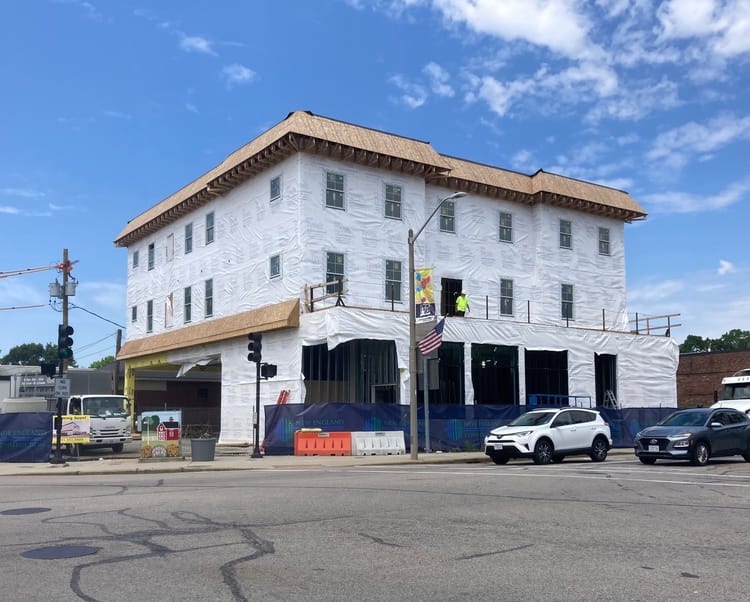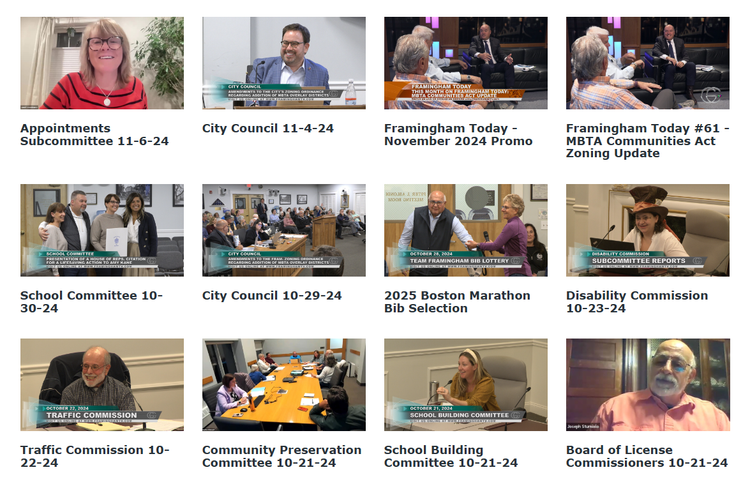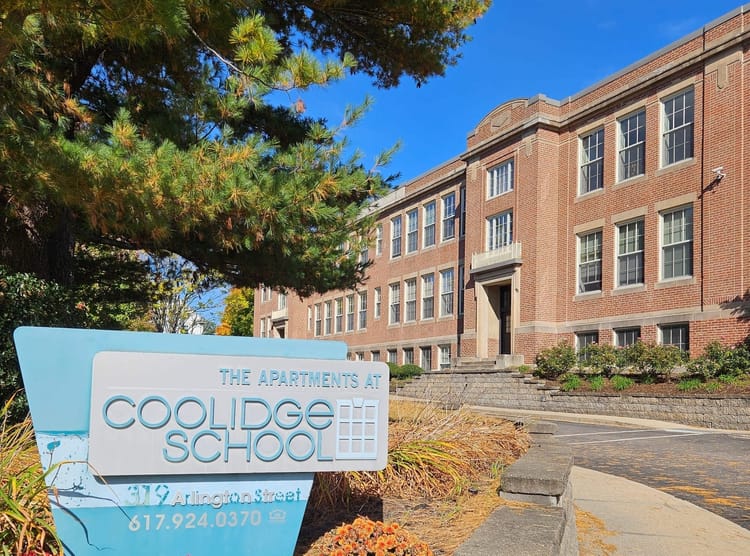The Law of the Land (Use)

By Amy Dain
Leaders are showing up across MBTA Communities to usher in a new era of transit-oriented housing development. In reaction, The Boston Globe reports, opponents have been organizing in some communities, calling state oversight of local land use laws “unconstitutional” and a threat to local “sovereignty.” These cries are rhetoric, not the study of law. But still, we asked a leading expert on land use law to weigh in on the critiques, especially with an eye to one such community much in the news, Milton.
Professor of Law at Suffolk University John Infranca offers us these comments about the Attorney General’s complaint against Milton’s non-compliance with the MBTA Communities zoning law. He looks at A) exercise of state power, B) whether the MBTA Communities law is mandatory, and C) whether the state’s compliance guidelines are mandatory.
The Massachusetts Attorney General’s Complaint against Milton notes at the outset that states retain “supreme power” over zoning and that the Commonwealth can and has in the past constrained local control. Zoning, an exercise of the state’s police power to regulate in furtherance of health, safety and welfare, is a power conferred to local governments via a zoning enabling act. Local governments, unlike states and the federal government, are not sovereigns. What powers they have must be granted through state statutes or constitutions. Even when recognizing zoning as a valid exercise of the police power in Euclid v. Ambler Realty, the Supreme Court remarked that situations may arise “where the general public interest would so far outweigh the interest of the municipality that the municipality would not be allowed to stand in the way.”
The Complaint also argues effectively that compliance with the law is mandatory. In addition to emphasizing the use of the term shall, it notes that the presence of specific administrative penalties does not render the law not obligatory. In other words, municipalities are not free to ignore the law and simply accept the loss of state funding.
As for the binding force of the EOHLC guidelines, the Complaint cites Fairhaven Housing Authority v. Commonwealth 493 Mass. 27 (2023) with regards to the authority to promulgate guidelines. As for whether they are mandatory, in Fairhaven the court cited the definition of “guidelines” before stating: “[t]his definition does not preclude such rules being mandatory.” At the very least, the court will deem the guidelines, as they have in other contexts, entitled to “substantial deference.” Given how much courts enjoy getting in the weeds of zoning (not at all) that deference will be quite substantial.
For more of Professor Infranca’s recent writing about police power and zoning authority, see Singling Out Single-Family Zoning in the Georgetown Law Review and a Suffolk University Law School research paper Single-Family Zoning and the Police Power: Early Debates in Boston and Seattle. And for more about Milton, scroll to the In the News section below.
Let's Talk About Impacts
Luc Schuster, Executive Director of Boston Indicators, is also looking beyond the rhetoric—to consider what the scope of actual change from the law might be. His cogent analysis is up on CommonWealth Beacon.
QUICK QUIZ: What share of developable land in the state’s 177 MBTA Communities does the new zoning “mandate” apply to? Given the pitched debate over things like Milton’s referendum vote not to comply, the answer might surprise you: 0.60 percent.
Next question: How many housing units does it require to be built? Zero.
If those answers don’t match what you’re hearing around the MBTA Communities law, you’re not alone. Its real impact will be far less than the rhetoric from both sides of the debate. Proponents tout it as a transformative effort to tackle racial segregation and build affordable housing in our region’s most exclusionary suburbs. There is truth in these claims. But now that we’re shifting to implementation, I worry that overstating the law’s magnitude has contributed to the blowback.
In the News
But what about…transit?
“But what about the sewage?” asks GBH News in this investigative piece. The article suggests that the technical challenges and expenses of sewage disposal, whether by septic system, package treatment plant, or sewer extension, may make multifamily development infeasible in several towns. It would mean that zoning districts compliant with the MBTA Communities law will not always see new residential development. (This may also be the case, for various reasons, even in places with good sewers.)
Clark Ziegler, executive director of Massachusetts Housing Partnership, replied to the GBH article in a LinkedIn post: “In many cases it’s possible to achieve the 15 units/acre allowed in MBTA Communities zoning districts at the developer’s expense and without the creation or expansion of municipal sewer systems.” Ziegler also suggests that the state will step up to help with the cost of sewer extension in some places.
Zoning creates one set of barriers to multifamily housing development; the needs of sewage disposal can create a separate set of barriers. The MBTA Communities law was designed to address the zoning barriers, not the sewage barriers. Indeed, there are many barriers to transit-oriented development that zoning reform will not itself solve including (but not limited to): failing transit, high costs of construction materials and labor, high costs of borrowing, and inadequate infrastructure. Some people argue we need to solve these other issues before we rezone. Actually, rezoning for growth provides a signal to public officials and private companies that an area is worth investment—that it makes sense for them to figure out the sewage issues, to prioritize the transit investments, to innovate construction paradigms.
An analysis in the Boston Herald quotes a Milton Select Board Member asking, “If the state gets 10 years to get the Mattapan Line right, why don’t we get 10 years to get zoning right?” Part of the answer, not offered in the Herald analysis, is that it can take decades to see buildout after rezoning. If we rezone now, and ramp up investment in transit now, Greater Boston may see actual transit-oriented residential development in our lifetimes.
Put another way, why plan for and invest in growth—if growth is illegal? Massachusetts needs to legalize, plan for, and invest in transit-oriented growth.
What about Milton?
Milton has remained in the local headlines since its February referendum vote. The biggest news was the Attorney General Andrea Campbell’s suing Milton for lack of compliance with the MBTA Communities law.
Jennifer Smith of CommonWealth Beacon offered an in-depth rundown of what the Milton case is about. Smith’s analysis includes a link to the Upzone Update!
Adrian Walker outlined several reasons, in the Boston Globe, that MBTA Communities should be enforced, including that “The legislation […] passed the State House with enthusiastic bipartisan support.”
Bruce Mohl at CommonWealth Beacon reports on the discussions at Milton’s Planning Board and the nuts and bolts of how this process is playing out.
Howard Husock, senior fellow at the American Enterprise Institute and former Brookline Town Meeting member, argues in the Boston Globe that “Persuasion, not mandate, is the right path forward,” and that 15 units per acre is a high bar for some communities, like Milton. The Globe Editorial Board responded to Husock’s argument: “Amid a housing crisis, Milton can’t be allowed to flout new zoning law.” The Editorial Board explained: “There’s about 100 years of proof, up to and including Milton’s ‘no’ vote last month, that the suburbs are not going to allow more housing simply out of the goodness of their hearts.” It is also worth noting that 15 units per acre is generally considered low-density for multifamily housing, easily surpassed in traditional triple-decker neighborhoods.
In a Letter to the Editor of the Boston Globe, Nate Stell points out that some coverage of the Milton referendum implies that the zoning plan in question would have permitted more than 2,400 units—but a consultant’s analysis of the zoning plan suggested that 900–1,000 units is a more likely outcome.
CHAPA CEO Rachel Heller argued in a Globe letter to the editor that all cities and towns, including Milton, need to do their part in allowing needed housing: “Let’s rise to the occasion like Massachusetts always does. Let’s say yes to more homes in our neighborhoods.”
This article in Patch explains why Holden has more time to comply with the law than Milton.
What about Wellesley, Natick, Plymouth, Hull, Wilmington, and Wrentham?
The MetroWest Daily News reported on Natick and Wellesley’s rezoning efforts. In Wellesley, the proposal would only impact districts currently zoned as commercial, business, and industrial. Natick completed some of the rezoning last spring during Town Meeting, and plans to finish meeting the compliance guidelines at town meeting this coming fall.
The Hull Times explains what MBTA Communities means for Hull.
WATD (95.9 FM) has an update on what Plymouth officials are considering. In particular, they are looking at zoning where there is existing or recently permitted multifamily housing, for example at Pine Hills, Colony Place, Home Depot Drive, and Cordage. It is a strategy of taking credit for multifamily housing already there.
Patch reports that Wilmington made revisions to its proposal based on the state’s feedback in its pre-adoption review.
MassLive reports that Wrentham is against complying with the MBTA Communities law. The State House News Service explained that Wrentham officials have reached out to Governor Maura Healey to ask for a waiver or modification of state requirements.
But what about equity?
State Senator Lydia Edwards and Tufts Professor Emeritus James Jennings call for housing policy to be equitable, in this opinion piece in the Boston Globe: “The call for production of more affordable housing must be conjoined with strategies to enhance the monitoring and enforcement of fair housing.”
Events, Hearings, Meetings, Votes
Norwood’s MBTA Communities Task Force and Planning Board have submitted draft articles, including a proposed amended Zoning Map and Zoning Bylaw to the Board of Selectmen for inclusion on a March 21 Special Town Meeting warrant. The Planning Department, Task Force, and Planning Board will hold an “Open Mic Night” on March 11 at 7:00 pm to discuss the proposal.
The Burlington Planning Department is hosting an info session on MBTA Communities on Wednesday, March 13 from 6:00 to 8:00 pm, at Grand View Farm, 55 Center Street.
Hull’s Planning Board will hold a public hearing on MBTA Communities zoning, and also on ADU policy and the establishment of a floodplain district, on March 13 at 7:30 pm.
Wellesley plans to vote on MBTA Communities zoning at the annual Town Meeting, starting March 25.
Plymouth Town Meeting will look at the proposed zoning overlay district when it convenes on April 6.
Andover will vote on zoning reforms at its Special Town Meeting scheduled for April 29 to May 2. Andover’s Planning Board has scheduled a virtual discussion of MBTA Communities zoning on March 12 at 7:00 pm. Registration is required.
Wilmington plans to vote on MBTA Communities zoning at its annual Town Meeting on May 4. The proposed zoning will be presented at the Wilmington Planning Board’s joint public hearing with the Finance Committee on March 19 at 7:00 pm in the Town Hall Auditorium.
North Andover plans to vote on MBTA Communities zoning at Town Meeting in May.
Public event: Tools and Strategies for Explaining MBTA Communities Zoning
March 19, 12:00 – 1:30 pm
Learn how planning consultants and practitioners are helping voters understand complex zoning proposals in advance of city council and town meeting votes. Panelists include:
- Judi Barrett, Founding Principal and Managing Director, Barrett Planning Group
- Ian Burns, Community and Economic Development Program Manager, Merrimack Valley Planning Commission
- Lee Hartman, Director of Planning and Development, Town of Plymouth
- Erin Wortman, Planning and Community Development Director, Town of Stoneham
- Brian Szkeley, Planning Director, Town of Danvers
Public event: Fostering Effective Public Engagement
On Zoom, April 1, 9:45 am – 12:45 pm, including two short breaks.
Register here. (The virtual event is free.)
In person, April 10, 9:00 am – 1:00 pm, at 100 High Street, Boston.
Register for the in-person session. (The cost to attend is $50. A light breakfast and lunch will be served.)
Registration will close one week before the training, or once capacity is reached, whichever is sooner.
MHP has partnered with Citizens Housing and Planning Association (CHAPA) and the Consensus Building Institute (CBI) to develop an interactive training. The training will start by framing why it is important to create safe and effective public meeting spaces, followed by an overview of four main topics:
- Understanding legal requirements pertaining to public meetings.
- Engaging in effective outreach and creating meeting ground rules.
- Structuring public meetings for success.
- Learning how to keep a meeting from going off-topic.
The audience for the training includes municipal staff and board members, as well as local housing advocates. Trainers include staff from the Attorney General’s office, MAPC, and CBI.





